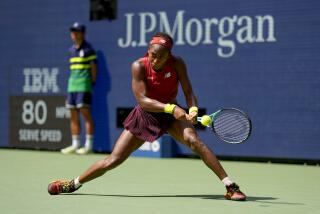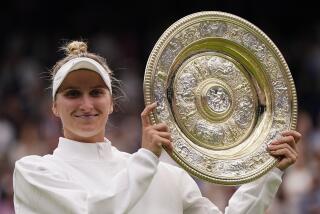Navratilova Defeats Sukova for Title in Tale of 2 Countries, 6-3, 6-2
- Share via
NEW YORK — Life has been good to Martina Navratilova. She says she feels fortunate. In fact, she said: “If I’d known this is what it’s like to have it all, I would have settled for less.”
It’s hard to imagine Navratilova settling for less--less in tennis, less in life. It was the search for more that led her to defect from Czechoslovakia at the U.S. Open 11 years ago.
That’s why, Navratilova says, it means more to her to win at the U.S. championships as an American. When she beat seventh-seeded Helena Sukova of Czechoslovakia, 6-3, 6-2, in Sunday’s women’s singles final, she was bursting with pride and happiness.
It was different for Sukova. For her, life has been fickle. She was given the lithe body of a 6-foot 2-inch athlete. She was born to parents who, when she showed an interest in their game of tennis, nurtured her until she blossomed in the sport.
Tennis gave her a mother who would be her best friend, her coach and her idol. Then all that was taken away.
Martina Navratilova knew Vera Sukova well. Helena’s mother was Martina’s coach, as she was coach for the entire Czech national team. In those early days in Prague, while Navratilova was practicing with Vera Sukova, Helena was off on the side hitting balls with Martina’s younger sister, Jana. Sometimes, Helena was allowed to be a ball girl at Navratilova’s matches.
In this way, the girls grew up together in tennis. Czechoslovakia was watching and hoping for the best two women in tennis to be proud of.
Something happened to disappoint Vera Sukova and the nation that had such hopes for Navratilova: Navratilova defected to the United States and denounced her homeland. She said she wanted to be free.
Helena Sukova knew that after Navratilova’s defection, her mother was under stress. She knew her mother wasn’t feeling well and was often tired. Helena Sukova watched as her mother, a Wimbledon finalist in 1962, slowly died of a brain tumor four years ago.
Somewhere in her mind, she made a connection between her mother’s ill health and the defection of Navratilova.
Now, Navratilova, 29, is an American, and she and Sukova, 21, meet on the tennis court at tournaments around the world. Navratilova has bought into the dream. She has the homes, the cars and the jewelry. She has earned more than $10 million in her career and added $210,000 for Sunday’s win.
“That (Czechoslovakia) is where I was born,” Navratilova said. “This is my home. That is my home country because I was born a Czech. I am an American now. I have not felt not-American since I’ve lived here. I think I appreciate living here a lot more than people who have been born here and sort of take it for granted. I had to earn it. I had to take a test.”
Sukova is a Czech. Her father is the president of the Czechoslovakian Tennis Federation. Thanks to the threat of another Navratilova-like defection, Sukova and other Czech tennis players have received more freedom. They travel and live where they wish. They must only give the Federation 20% of their earnings.
Sukova, who has earned $391,935 this year, won $105,000 Sunday. She is often asked political questions but says, “I am a tennis player, not a politician.”
Sukova says that playing Navratilova is no different from playing anyone else on the tour. “It’s been such a long time,” Sukova said.
When she says it, it’s not convincing.
Said Navratilova: “I thought a lot about the ties that we have there with her mother. She’s played some tough matches against me, but I don’t think it has anything to do with our past; we’re beyond that now.”
Still, after Sunday’s match, Navratilova went over to Sukova and consoled her. Sukova looked “shell-shocked,” Navratilova said.
“I was glad I was able to pull it out today,” Navratilova said. “I was playing really well in practice, hitting returns really well. Helena was missing a lot of first serves, and I couldn’t do anything with her first serve. When she did get some first serves in, it took me awhile today to get my rhythm.”
Sukova got in only 47% of her first serves and managed only seven service winners for the match. Beyond that, she double-faulted three times and made 10 unforced errors, twice as many as Navratilova.
“At the beginning I thought I had a chance at 3-1, and I had an ad for 4-2,” Sukova said. “Afterwards, it just slipped away and I never got it back. I’m disappointed because I thought I had a chance, but she played too well.”
For Navratilova, it was her third U.S. Open title, and this one took exactly one hour. She is dominating women’s tennis today as no one has. She’s rich and happy. And she’s free.
“To win the U.S. Open will always be very special,” Navratilova said. “I know I’m not a born American, but my heart is very much here and it definitely has an extra edge to it because it is home.”
More to Read
Go beyond the scoreboard
Get the latest on L.A.'s teams in the daily Sports Report newsletter.
You may occasionally receive promotional content from the Los Angeles Times.











